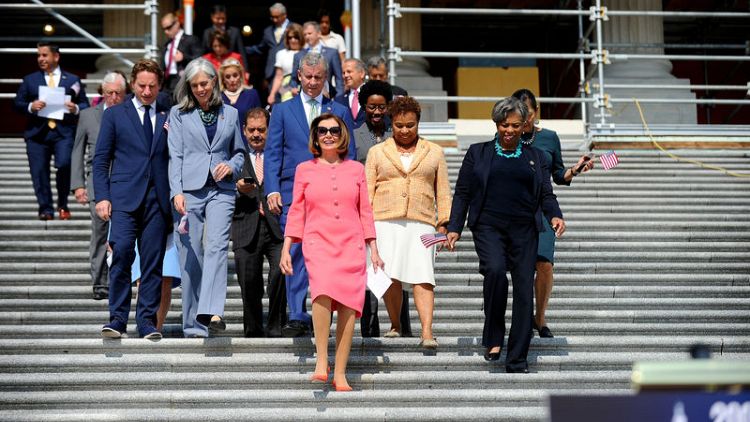By David Morgan
WASHINGTON (Reuters) - A day after former U.S. Special Counsel Robert Mueller's high-profile testimony, House Democrats vowed to push forward with an investigation of President Donald Trump that could delay any move on impeachment into the 2020 election campaign season.
The House of Representatives Judiciary Committee is expected to move its obstruction investigation of the president into federal court this week with a lawsuit to compel former White House Counsel Don McGahn to testify and a separate legal request for access to the Mueller probe's grand jury evidence.
McGahn is key to the committee's obstruction case against Trump, and Democrats contend that obtaining a court order forcing McGahn to comply would break what House Judiciary Chairman Jerrold Nadler called a “logjam” of uncooperative witnesses created White House stonewalling.
The House Oversight and Reform Committee on Thursday postponed a vote to hold Trump senior adviser Kellyanne Conway in contempt for defying a subpoena to appear at a hearing on allegations that she violated laws limiting the political activity of federal employees.
The full House voted to hold Attorney General William Barr and Commerce Secretary Wilbur Ross in criminal contempt last week for defying House Oversight subpoenas related to the U.S. Census. Barr's Justice Department declined to pursue criminal charges against the two officials.
"We need to hear from a few more witnesses who are key characters in the Mueller report," Democratic Representative Jamie Raskin said of the investigation by the Judiciary Committee, which has jurisdiction over impeachment.
But as Democratic members of the committee contemplate court action now and fresh hearings later in the year, the clock for any move towards impeachment appeared to be ticking down.
Lawmakers are due to leave Washington on Friday for a six-week break. Legal action could tie Democrats up in court for months, during which time Congress and the public are expected to pivot to the 2020 election campaign.
TIME TO MOVE?
Democratic Representative John Garamendi told CNN that if lawmakers do not move forward with starting impeachment proceedings now "the risk is that we have abandoned our responsibility."
Nadler told House Democrats on Wednesday that committee chairs could begin drafting articles of impeachment against Trump. But Politico reported that House Speaker Nancy Pelosi rebuffed the idea as premature.
Democrats had hoped Mueller's testimony on Wednesday would be a watershed event capable of persuading the public to see Trump as a lawless president and sparking a formal impeachment inquiry.
Mueller made it clear that he did not exonerate Trump of wrongdoing and helped highlight possible evidence of obstruction in his 448-page report. But his testimony appeared to do little to change opinions about Trump.
"The next step for us, after we had Mueller here ... (is) essentially to put on the evidence of obstruction of justice, and that means bringing in all the people who were subject, starting with McGahn," said Representative Ted Deutch, a Judiciary Democrat.
McGahn, who was a star witness in Mueller's 448-page final report, has refused to testify to Nadler's committee at the direction of the White House.
Democrats view him as a central figure in their probe into whether Trump tried to obstruct Mueller's inquiry. McGahn testified to Mueller that Trump instructed him to have the special counsel removed and to deny having been told to do so.
Testimony from McGahn to that effect at an open hearing could give Democrats the evidence they need for an impeachment inquiry. McGahn declined to testify earlier this year, after the White House directed him not to cooperate with the committee.
Mueller's report on his 22-month investigation, released in mid-April, found insufficient evidence to allege that the Trump campaign conspired with Moscow in its effort to help Trump get elected in 2016, although campaign officials met with Russians.
The report provided no view on whether Trump tried to obstruct Mueller's inquiry. Both issues dominated the Wednesday hearings, in which Mueller emphasized he had not exonerated Trump of obstruction of justice, as the president has claimed, but sometimes struggled to keep up with lawmakers' questions and gave occasionally halting answers.
(Reporting by David Morgan; additional reporting by Richard Cowan and Susan Cornwell; Editing by Peter Cooney and Bill Trott)












